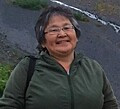In this webinar, Emily Murray and Dr. Edwyn Lyman discussed the impact of nuclear power on Alaskans and worldwide. Nuclear power is touted as a safer alternative to power generation using fossil fuel. Our guests discussed this claim from their own perspectives and research, including the consequences of uranium mining and processing, the disproportionate impact of uranium mining on Indigenous lands, risks associated with the operation of nuclear reactors, issues surrounding perpetual storage of spent nuclear fuels, and the ways in which nuclear power generation contributes to the proliferation of nuclear weapons.
Alaska has a history of nuclear experimentation, including weapons testing on Amchitka Island in the Aleutian Archipelago, unrealized plans to create a deepwater port near Point Hope, a nuclear reactor operating at the Fort Greely military base near Delta Junction from 1962-1972, and uranium mining at the Ross-Adams Mine in Southeast Alaska. More recently, uranium exploration has taken place near Elim, Alaska on the Seward Peninsula.
Recently adopted state legislation in Alaska streamlines the permitting of small nuclear reactors, dubbed as “micronukes,” for use in rural communities and to power remote mining operations. Alaska Governor Dunleavy’s Administration is moving forward with proposed regulations on the siting of “microreactors.” There are serious health and safety concerns with micronuclear reactors, and they are a false solution for Alaska's energy needs and the climate crisis.
Alaska Community Action on Toxics has worked on nuclear power and weapons issues in Alaska since the organization's inception in 1997. This includes publication of two reports on the consequences of the Amchitka Island nuclear tests in the Aleutian Islands and an investigative report on the Fort Greely nuclear reactor. See the "slides and resources" section for these and other related links.
Featured Speakers
 Emily Murray is the Vice President of the Norton Bay Inter-Tribal Watershed Council and a teacher at Aniguiin School in the Inupiat village of Elim, Alaska, where she works with students to conduct research about the effects of uranium on community health. Emily presented on CHE-Alaska in 2008 on the topic of Uranium Mining and Community Health: Environmental and Health Concerns about Proposed Uranium Mining in Alaska.
Emily Murray is the Vice President of the Norton Bay Inter-Tribal Watershed Council and a teacher at Aniguiin School in the Inupiat village of Elim, Alaska, where she works with students to conduct research about the effects of uranium on community health. Emily presented on CHE-Alaska in 2008 on the topic of Uranium Mining and Community Health: Environmental and Health Concerns about Proposed Uranium Mining in Alaska.
 Edwyn Lyman, PhD is the Director of Nuclear Power Safety at the Union of Concerned Scientists in Washington, DC. He earned a doctorate in physics from Cornell University in 1992. From 1992 to 1995, he was a postdoctoral research associate at Princeton University's Center for Energy and Environmental Studies (now the Science and Global Security Program). From 1995 to 2003, he worked for the Nuclear Control Institute. His research focuses on nuclear power safety and security. He is a co-author, with David Lochbaum and Susan Q. Stranahan, of the book Fukushima: The Story of a Nuclear Disaster (The New Press, 2014). He is the recipient of the 2018 Leo Szilard Lectureship Award from the American Physical Society. He is the author of the 2021 Union of Concerned Scientists report, "Advanced" Isn't Always Better: Assessing the Safety. Security, and Environmental Impacts of Non-Light-Water Nuclear Reactors, pertaining to changes in nuclear reactor
Edwyn Lyman, PhD is the Director of Nuclear Power Safety at the Union of Concerned Scientists in Washington, DC. He earned a doctorate in physics from Cornell University in 1992. From 1992 to 1995, he was a postdoctoral research associate at Princeton University's Center for Energy and Environmental Studies (now the Science and Global Security Program). From 1995 to 2003, he worked for the Nuclear Control Institute. His research focuses on nuclear power safety and security. He is a co-author, with David Lochbaum and Susan Q. Stranahan, of the book Fukushima: The Story of a Nuclear Disaster (The New Press, 2014). He is the recipient of the 2018 Leo Szilard Lectureship Award from the American Physical Society. He is the author of the 2021 Union of Concerned Scientists report, "Advanced" Isn't Always Better: Assessing the Safety. Security, and Environmental Impacts of Non-Light-Water Nuclear Reactors, pertaining to changes in nuclear reactor
 This call was hosted by the CHE-Alaska Partnership, which is coordinated by Alaska Community Action on Toxics (ACAT).
This call was hosted by the CHE-Alaska Partnership, which is coordinated by Alaska Community Action on Toxics (ACAT).
